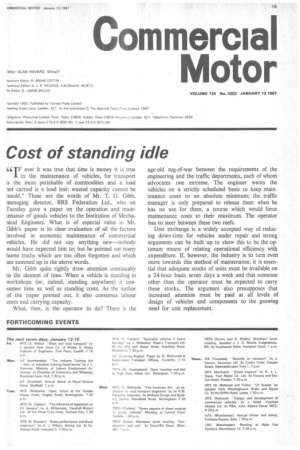Cost of standing idle
Page 17

If you've noticed an error in this article please click here to report it so we can fix it.
41T ever it was true that time is money it is true
1. in the maintenance of vehicles, for transport Ls the most perishable of commodities and a load not carried is a load lost: wasted capacity cannot be resold." These are the words of Mr. T. G. Gibb, managing director, BRS Federation Ltd., who on Tuesday gave a paper on the operation and maintenance of goods vehicles to the Institution of Mechanical Engineers. What is of especial value in Mr. Gibb's paper is its clear evaluation of all the factors involved in economic maintenance of commercial vehicles. He did not say anything new—nobody would have expected him to; but he pointed out many home truths which are too often forgotten and which are summed up in the above words.
Mr. Gibb quite rightly drew attention continually to the element of time. When a vehicle is standing in workshops (or, indeed, standing anywhere) it consumes time as well as standing costs. As the author of the paper pointed out, it also consumes labour costs and carrying capacity.
What, then, is the operator to do? There is the age-old tug-of-war between the requirements of the engineering and the traffic departments, each of whom advocates one extreme. The engineer wants the vehicles on a strictly scheduled basis to keep maintenance costs to an absolute minimum; the traffic manager is only prepared to release them when he has no use for them, a course which would force maintenance costs to their maximum. The operator has to steer between these two reefs.
Unit exchange is a widely accepted way of reducing down-time for vehicles under repair and strong arguments can be built up to show this to be the optimum means of relating operational effieiency with expenditure. If, however, the industry is to turn even more towards this method of maintenance, it is essential that adequate stocks of units must be available on a 24-hour basis seven days a week and that someone other than the operator must be expected to carry these stocks. The argument also presupposes that increased attention must be paid at all levels of design of vehicles and components to the growing need for unit replacement.








































































































